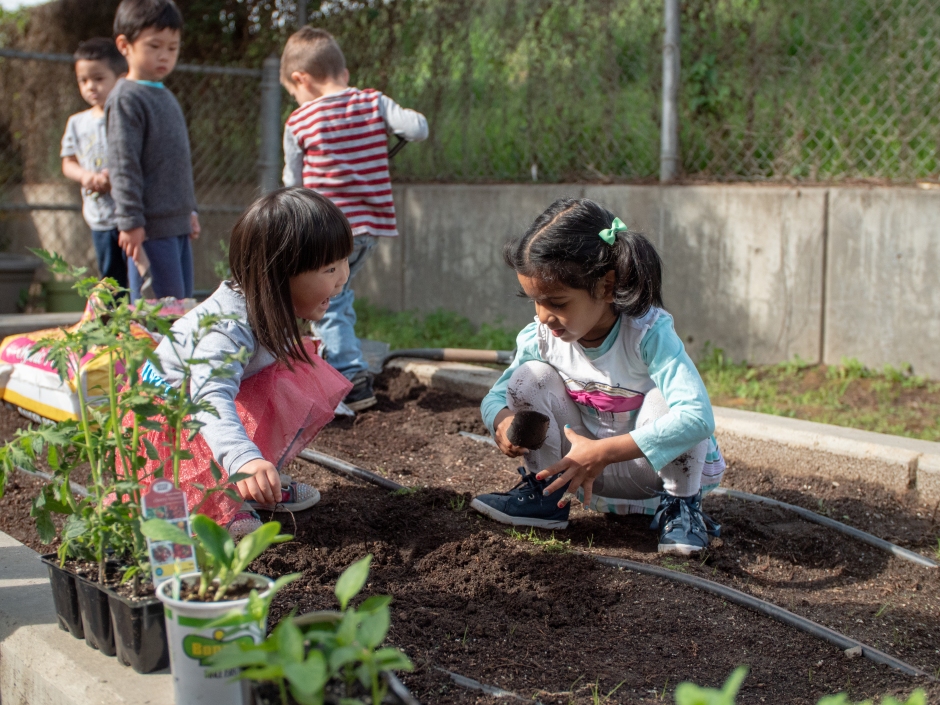Community Garden projects are gaining momentum across the country as they serve as places to beautify and unite neighborhood communities as well as to grow crops in neighborhoods where there are issues of food insecurity. Community gardens have been shown to have many strong and positive impacts wherever they are established. They serve as spaces to educate children about beauty and conservation, allowing citizens to explore their cultural heritage through community practices associated with food production, agricultural traditions and storytelling, and serve as natural gathering places which unite the community. Existing gardens on Fresno State’s campus include the Peace Garden, Maple Mall Arboretum, Allergy-Free Demonstration Garden, and the Memorial Plaza Garden.
The Kremen School of Education and Human Development is currently embarking on their own project to connect outdoor education efforts on Fresno State’s campus to community members and local agencies. Kremen employs innovative models of teaching that emphasize the importance of STEAM (science, technology, engineering, arts, and math) in Transitional Kindergarten (TK-12) education. Studies show that outdoor learning experiences positively impact science, literacy and math standards as well as the environmental, nutritional, social-emotional aspects of learning and development. Opportunities to explore outdoor classrooms and gardens have proven to transform the academic experience, contributing to increased teacher commitment in the sciences as well as improving student interest and curiosity in the natural world. To meet the growing need for outdoor learning spaces that support wellness, research and STEAM education across a range of ages and disciplines, the Kremen School is establishing a SECREd Garden Demonstration Program. The name SECREd Garden stands for STEAM Experiences through Community, Research, Education and Demonstration.
The SECREd Garden program was founded by Christina Macias and was inspired by her Master’s work in Early Childhood Education at the Kremen School. The primary scope of her research was centered around the barriers and affordances of early science education. She became interested in providing developmentally appropriate spaces that would engage young learners in the field of science exploration. This interest spurred her on a year-long journey of visiting school gardens, farms, and outdoor learning spaces across the state to gather a better understanding of how to establish her vision.
“The SECREd Garden will provide for equitable and accessible science experiences for young children while supporting pre-service teacher training, research, the community, the Fresno State campus, and most importantly: food security and wellness opportunities.”
– Christina
While Christina was the initial creator of the project, it quickly transformed into an expansive group effort, requiring the involvement of professionals, students, and volunteers spanning across multiple disciplines.
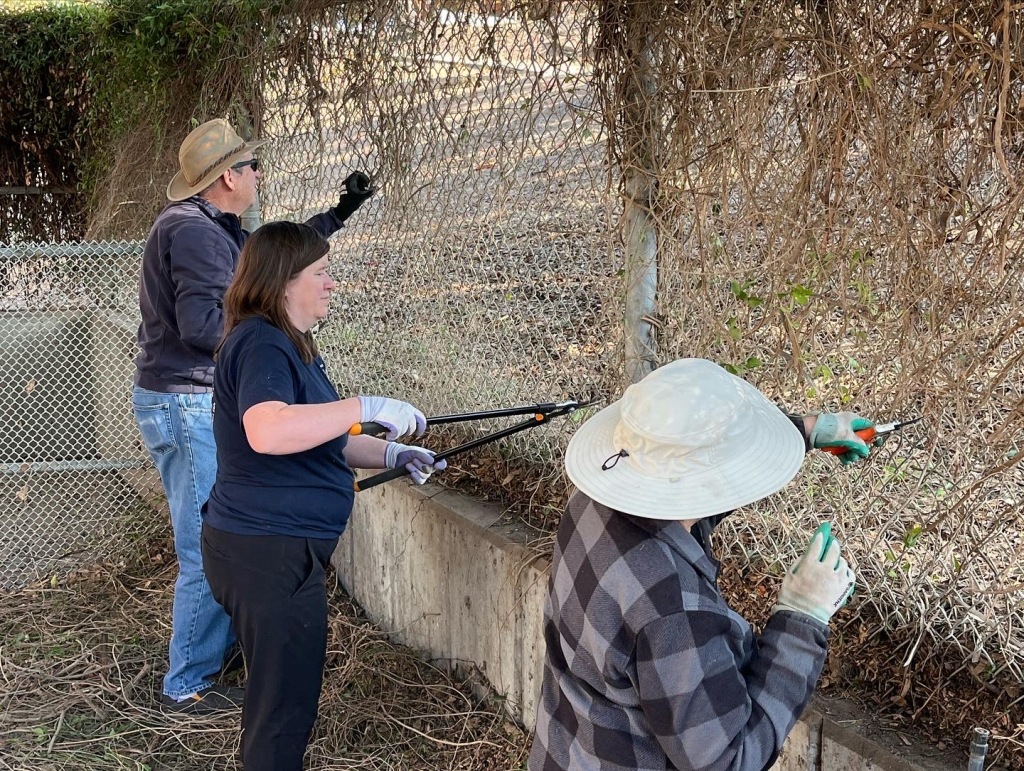
“I continue to be inspired by the range of interest and participation in the project from students, Fresno State faculty and the surrounding community. The range of expertise and commitment to this work has been more than I could have imagined.”
– Christina.
The original concept for the SECREd Garden was developed in partnership with Dr. Cathy Yun, a Senior Researcher at the Learning Policy Institute, and was presented to the University in 2016. Time was spent over the next year introducing and refining the project details in collaboration with the Campus Planning Committee, VP for Administration Deborah Adishian-Astone, and Associate VP for Facilities Management Tinnah Medina.
Calliope Correia, an Instructional Support Technician III with the Jordan College of Agriculture Science and Technology, was introduced to the project early on as she was recognized as the campus expert on effective horticulture practices. Her work is deeply rooted in wellness and therapeutic methods which aligns with the program’s central mission to connect the community with natural spaces.
“Access to natural spaces, whether wild or intentionally designed, is critical to our well-being. The SECREd garden is a wonderful culmination of ideas and experiences that will benefit the University and the community not only with harvests and access to fresh vegetables but for the opportunity to play in the soil and get dirty!”
– Calliope.
Calliope has remained a constant supporter, consultant, and visionary since the project’s inception. Through both her and Christina’s tireless efforts, the project was granted permission to explore Phase 1 in the Spring of 2018. It was determined that the SECREd Garden was to be located on the west side of the Kremen School.
Since then, an ongoing fundraising campaign has taken place to establish the necessary funding for placing the project out to bid. This campaign has been supported by ASI, community donors, and through DOG Days, along with other Fresno State Crowdfunding opportunities. While many project-related activities were put on hold during the COVID-19 pandemic, efforts were made to continue the development of the SECREd Garden. Outreach with numerous project partners allowed the program to grow despite its need for a physical location.
The proposed project includes the development and maintenance of a demonstration garden and an outdoor classroom space. The goal is to allow students and educators to address interdisciplinary research, partake in play-based learning, explore early science experiences, learn healthy eating habits, and study community food scarcity issues.
Jacob Hurst, a lecturer in the Fresno State Plant Science department, has created a detailed revegetation plan for the turtle pond located near the proposed site of the SECREd Garden. After acquiring measurements of the proposed space and taking aerial satellite shots, Jacob realized that there was a lot of work to be done. He intends to design a managed ecosystem for the children of the Huggins Center while also reducing the amount of maintenance required on the garden.
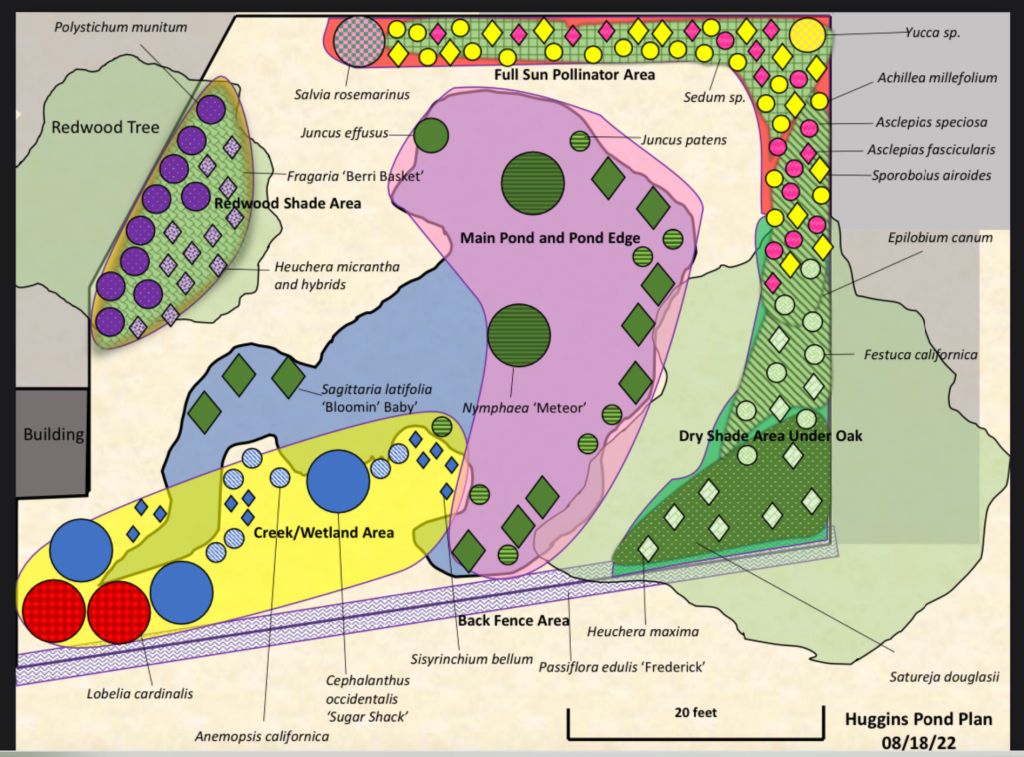
Jacob aims to alter the ecology of the landscape by introducing plants native to the area, allowing them to function as natural mulch to cover the bare patches of soil. Currently situated in the Huggins Center play yard, the Turtle Pond is a feature which Jacob plans to revitalize by creating shade using plants that produce thick leaves and foliage.
“There is some concern, especially during the summer, about having coverage for the turtles. Introducing water lilies, for example, or even simply denser vegetation around the edges, will provide countless benefits for them.”
– Jacob.
His revegetation outline also includes the introduction of more flowering vines to increase cross-pollination. To accomplish this, he intends to place Passion flowers along the back fence which will attract a variety of insects.
Another individual who has played a crucial role in the SECREd Garden project is Arashnoor (Arsh) Gill, a student in the Marriage, Family, and Child Counseling Master’s program in the Kremen School. Arsh was first introduced to the SECREd Garden and quickly appointed to the position of student leader through engaging with Christina Macias in an adolescent development course in the Child and Family Science department.
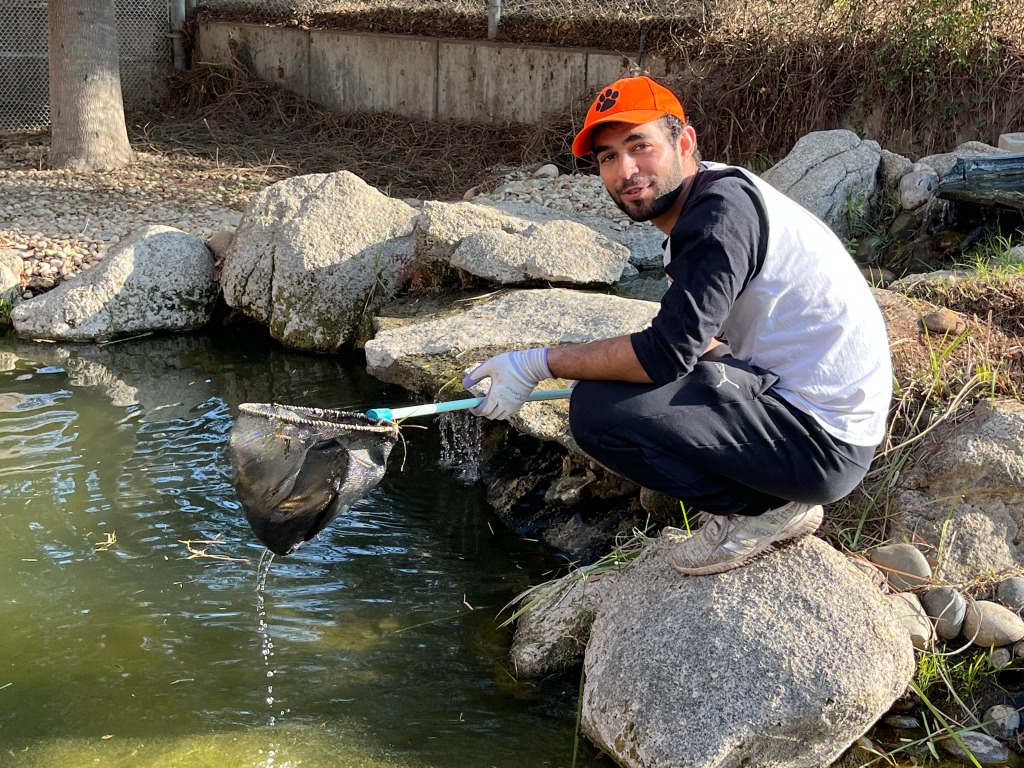
A primary goal for both Arsh and Christina has been to maintain a strong student presence within the project. By holding tabling and gardening events on campus, the two have been able to draw many students into the SECREd Garden student leadership committee, a group that meets on a regular basis.
Arsh has also helped develop a gardening curriculum for the CalFresh Healthy Living series by partnering with the Student Cupboard, currently assisted by Michael Ballin. He has helped reconceptualize the SECREd Garden as a non-physical entity and has worked with several other organizations to explore gardening and early education opportunities. Most recently, he has helped to develop a social media page for the project while also offering a pivotal presence during fundraising events.
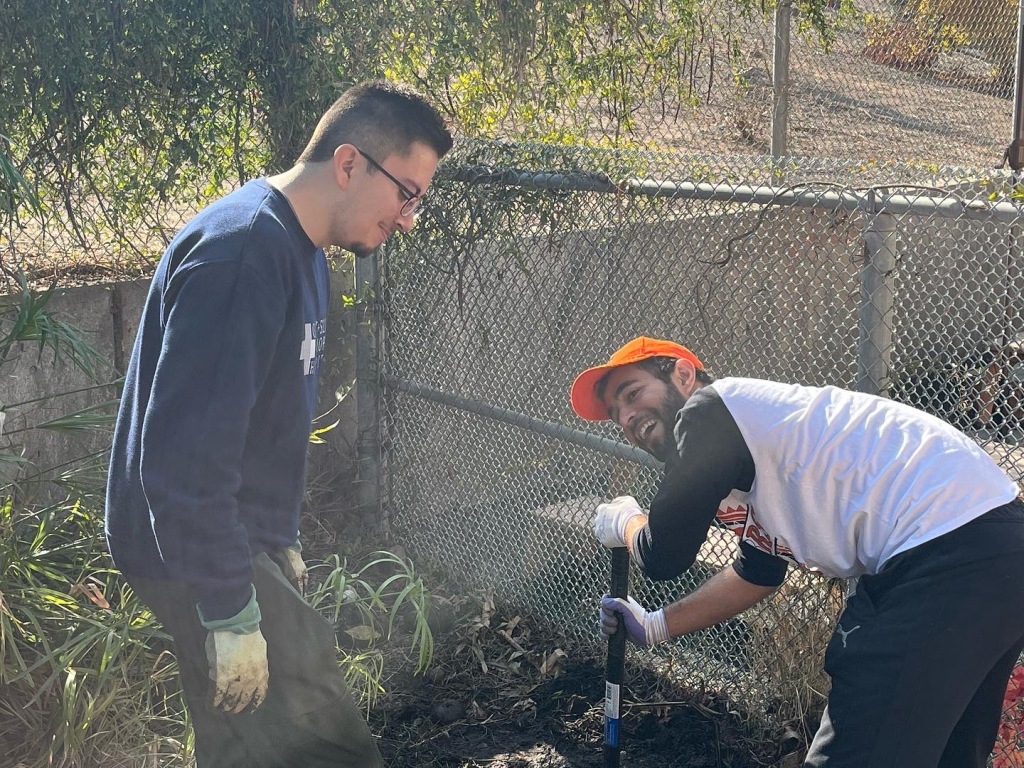
Arsh’s area of research is centered around multiculturalism, mental health, and how gardening is heavily influenced by cultural practices. Working on the SECREd Garden project has been an extremely fulfilling experience for Arsh and has allowed him to conceptualize how such a space can positively impact an individual’s outlook.
“Dean Yerrick and I would meet up at the turtle pond to remove the remaining banana trees. It was a fun experience for everyone involved because we would share stories, talk about our backgrounds, and discuss how much gardening meant to us.”
– Arsh.
The SECREd Garden has truly been a collaborative community effort. It would not have come this far in development without the countless volunteers who have participated in the program’s numerous projects over the years.
“We intend to leverage this garden to emphasize the education of children in the heritage of agriculture, sustainability, and the stewardship of resources that was practiced here in this area long before Fresno State was built. Indigenous people’s had important ways of managing resources and caring for the environment that need to be remembered and that we continue to learn from. Early childhood education at the Huggins Center is an important time and place to begin to emphasize STEAM education from a culturally sustaining perspective.”
– Dr. Randy Yerrick, Dean of the Kremen School.
Many contributions are from Fresno State faculty and staff who have devoted their time as consultants and provided expertise in building an inclusive framework for the project. There have been countless volunteers for site specific projects with unique connections to gardening practices, many of which have been University High School students. The SECREd Garden team is also incredibly grateful for the countless supporters who have provided substantial financial support over the course of the project.
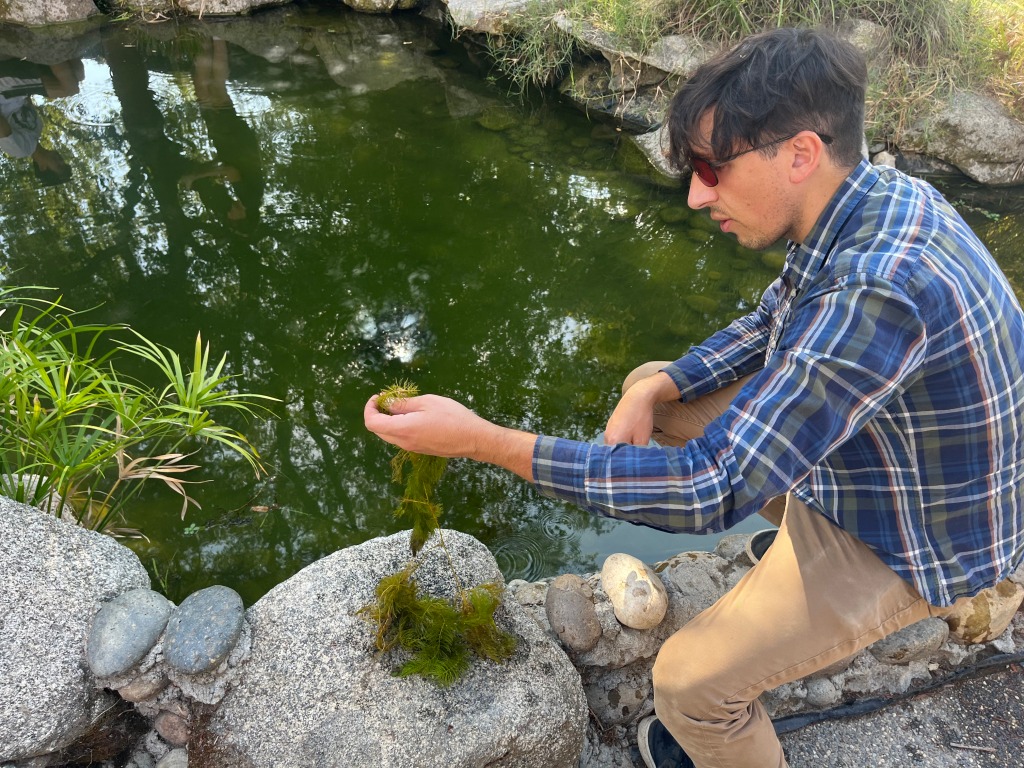
“Fresno State has the unique opportunity to serve as a demonstration model for outdoor learning, interdisciplinary partnerships, and the diverse cultural practices associated with land use and sustainable food practices. Our mission is to provide a space where all members of local communities can engage in work that supports their individual and community interests.”
– Christina.
Due to generous contributions from donors, we will now be able to break ground of the SECREd Garden in the Spring of 2023, however, more donations will be needed to fund future stages of the project.
If you want to make a donation to the SECREd Garden project, please visit this site.
(Written by Audra Burwell, a Creative Writing student employed by the Kremen School of Education and Human Development)
